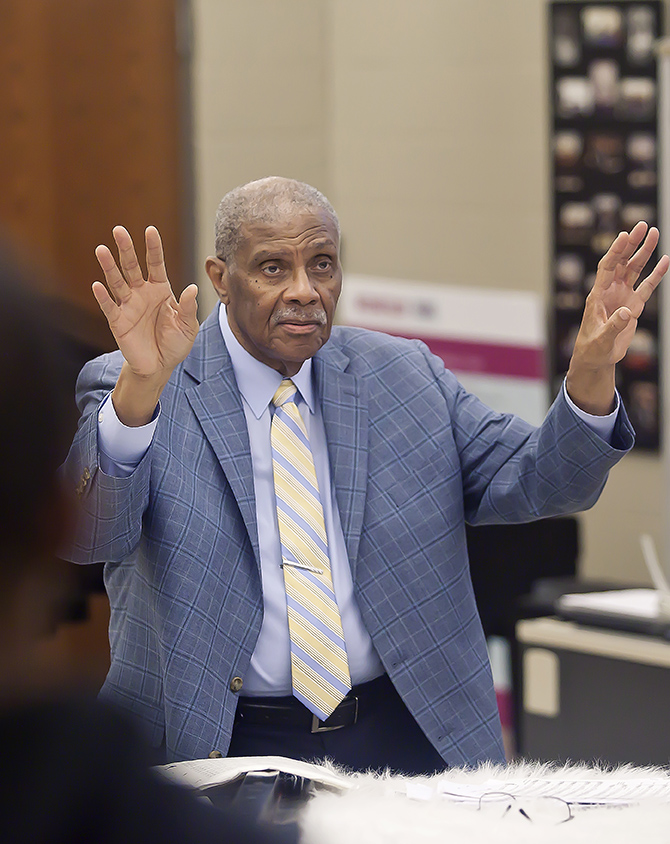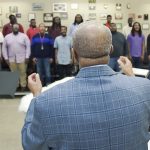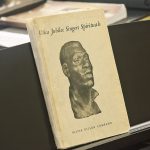When Dr. Bobby G. Cooper drove up to the new building on the Utica campus of Hinds Community College, he could hardly believe what he saw. “Dr. Bobby G. Cooper Fine Arts Building,” the sign read.
“I just didn’t believe it,” he said. He knew that often buildings are named for individuals, “but to have one named for me — I was just overwhelmed. I really was in disbelief. I really was.”
It was most likely no surprise, however, to the thousands of students he has taught — “They are beyond number” — for his tenure is the longest of anyone in the Hinds district. This is his 44th year on the Utica faculty.
Probably foremost in his legacy is bringing back the Jubilee Singers, a group that was first organized in the early 1900s by the founder of the college, Dr. William Holtzclaw. The Alabama professor hoped to begin a school along the lines of Tuskegee, which was begun by Dr. Booker T. Washington. Holtzclaw wrote a book, “Black Man’s Burden,” and told of a group of young men who sang spirituals at Utica. He called them the Jubilee Singers. J. Roseman Johnson, a brother to the famous black poet James Weldon Johnson, visited the campus and made a book of the songs he heard.
Cooper read Holtzclaw’s book, and he acquired a copy of Johnson’s songs. He thought about those early singers before putting together a quartet in 1980. They were a hit at their first performance, in Raymond at the Hinds employees’ banquet.
Cooper has expanded the group to about 15 young men. Their repertoire is not only spirituals, but they have expanded to just about everything in the genre of music. But, Cooper said, “The basic is our roots, the spirituals.” The men have sung in many parts of America and also in Italy.
The requirements to be a Jubilee Singer aren’t very strict, Cooper said. The singers don’t have to know music, but they do have to audition and “to be able to stay on pitch.”
Cooper’s own love of music began when he was a mere 4 or 5 years old. He grew up in Bolton and, before his mother died — when he was only 9 months old — she gave him to his uncle and aunt. They were the only parents he ever knew.
“I wanted to play so badly,” he said, that he would sit on the back steps “with a little wooden apple crate, and I would pretend I was playing a piano.”
The family didn’t have one — they couldn’t afford one — but Cooper’s mother worked for a Bolton family who planned to move. They didn’t want to take their piano, so they gave it to Cooper’s parents. There was a lady in Bolton who knew a little about how to play a piano — “Not much, but she did what she could to get me started.”
Cooper’s education began at the Bolton Colored School. His mother was the janitor at the white school, and he would help her in the afternoons. She also worked for the Grahams and Grants in the Hinds County town and they “just kind of took us in. I knew all the white folks in town, and we had what we wanted. I had a wonderful childhood. I was poor, but I really didn’t know it.”
After completing studies in Bolton, Cooper enrolled in the Tougaloo Prep School in Jackson at Tougaloo College, though, he said, “I really don’t know how I got there. There was tuition. I don’t know where my people got the money to send me.”
The first year he commuted, riding to Jackson with some people who worked in the Capital City. He would then ride a school bus from the train station to the Tougaloo campus. He excelled in his studies and in his senior year he was asked to live in the home of the principal, right off campus, who was retiring. After her death, her children, who lived in New Orleans, asked him to remain in the house, so, for his college career, he was able to stay at the school.
His early teaching career began at E.T. Hawkins High School in Forest. He was there for six years before writing an application for a grant to improve the teaching of music in the Scott County schools. That led to an offer of a scholarship, and he enrolled at the University of Illinois to continue his education. But a series of events kept him from it. He saw a former music professor from Tougaloo who told him to go to Clinton, where the music teacher had been hired, and to tell the principal that he, Cooper, would be the music teacher because the professor had decided not to take the job. The principal could hardly believe it, but, after a phone call, he hired Cooper.
“That was so many years ago,” Cooper said. “It was just the beginning of integration, and I had only one black face in the choir at Clinton.”
A visit to see an old friend in Forest led to his next educational adventure. Black teachers were being interviewed for the opportunity to seek advanced degrees and, though the applications were full and all possibilities of being accepted were closed, he was interviewed and, a few weeks later, was given a scholarship to pursue a specialist’s degree at the University of Colorado. Once that was completed, his professor said that he was so close to a doctorate that there was no point in his going back to Mississippi, “so I stayed and got my doctorate.”
In 1972, Cooper joined the Utica faculty when the college was part of a program, Opera South, which included Jackson State and Tougaloo.
The walls of his office are crowded with plaques and awards honoring him for his achievements in the field of music, but he laughs about the other times when there have been bloopers. He advises his students, when that happens. “Just keep going. Don’t stop. Keep rolling. You can laugh about it later.”
He has his favorite numbers sung by the Jubilee Singers. They include “Amen,” the spiritual “Witness” and “In This Very Room,” as well as “Ave Maria.”
On weekends, Cooper will be found at the piano at Asbury Methodist Church in Bolton, where he is a life-long member. He and his wife, who also has a doctorate and has retired from Jackson State, have two daughters and a son. Only one, Chris, is a musician — but not professionally. He has his doctorate in agriculture and teaches at the University of Tennessee.
There’s a tradition among the Jubilee Singers. Once you’re a member of the group, even in years to come, you’ll always be a Jubilee Singer. Cooper hears from many of them, some who have become teachers and professional musicians. Recently, one of his graduates, Cedrick Smith, who was Cooper’s accompanist and music arranger, has joined the faculty at Utica.
At 78, Cooper said he thinks about retirement at the end of each school year, “But, I don’t know. I just take it one year at a time.”
Though other schools have offered him positions in past years, Cooper said, “I’m so happy I stayed and made a career out of it. I have loved it here at Utica.”
Photos by Melanie Thortis










